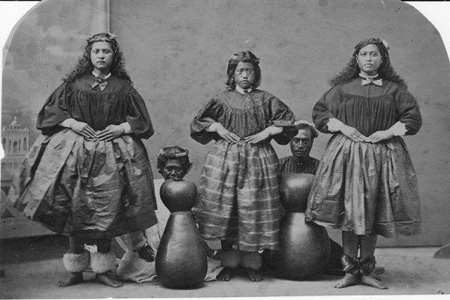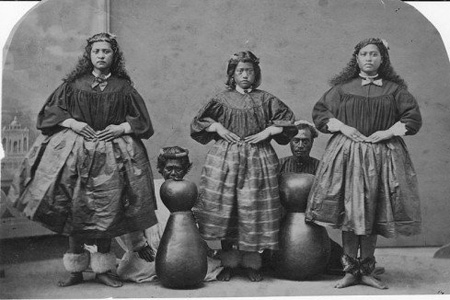"Loin des tracas, sous ton beau firmament
Je viens de vivre un si tendre roman
A l’ivresse de ton ciel bleu...
All I knew of Hawaii came from a few stanzas of a sentimental song sung by the well-known French crooner Tino Rossi in the far away days of French colonial rule:
"Loin des tracas, sous ton beau firmament
Je viens de vivre un si tendre roman
A l’ivresse de ton ciel bleu
Je viens dire un supreme adieu
Adieu Hawaii..."
which could be roughly translated as follows:
"Far from worries, under your beautiful sky
I have just lived such tender moments.
To your intoxicatingly blue sky
I’ve come to say a last farewell
Good-bye Hawaii..."
But only a week ago I received letters from two American friends in Hawaii in which a very interesting point was raised: the existence of possible blood ties between the native peoples of Hawaii and Vietnam.

Christin Pelzer, a professor involved in Southeast Asian Studies at the University of Hawaii, wrote: "Of all of the States and subcultures in the multicultural society in the United States, I believe that it is Hawaii which has the most kinship with Vietnam. Some believe that the original homeland of the Polynesian people, the indigenous people of Hawaii was in Vietnam".
Bob Krauss, a veteran reporter at the Honolulu Advertiser, drew a geographical parallel between Hawaii and Vietnam: "Hawaii and Vietnam have similar scenery because both lie in nearly the same latitude above the equator, around 20 degrees. In Hawaii there are coconut palms, flowering trees, pineapples, bananas, mangoes, tropical mountains, beautiful sand beaches and pretty girls (like in Vietnam)".
Krauss also drew a historical parallel: both countries were monarchies: The Hawaiian warrior Kamehameha unified all islands under his scepter in 1810. The dynasty founded by him reigned until the end of the 19th century, when Queen Lilivrokalani was overthrown in 1893 by citizens of foreign origin and inhabitants of Hawaii. The monarchic period in Hawaii coincided with that in Vietnam of the Nguyen. The new masters of Hawaii negotiated with the United States to turn their country into an American territory in 1898, which became the 50th State of the USA in 1959.
Krauss also drew an ethnic parallel. He believes in kinship between Hawaiians and Vietnamese. About this he has interviewed an eminent archeologist. Professor Wilhem Solheim. He has written an article on the Hawaiian belief in spirits dwelling in rocks and stones, animism being a feature of ancient Vietnamese spiritualism. There is a recent tie between the two cultures: "Some 8,000 immigrants have come from Vietnam. We in Hawaii are proud of our new Vietnamese neighbors who are doing well in business and professions, and add to our enjoyment of cultural diversity".
Bob Krauss's works are an excellent contribution to Vietnam-American reconciliation. They rejoin our researches on cultural relations between Vietnam and the other countries of Southeast Asia and the Pacific. Let us not forget that one of the ethno-linguistic components of Vietnam is the Malayo-Polynesian or Astronesian family. Polynesia is formed by islands of the central Pacific peopled by Polynesians within a triangle delimited by New Zealand (to be excluded because of its white population), the Hawaiian islands and Easter island. Its languages constitute the oriental branch of the Austronesian family.



